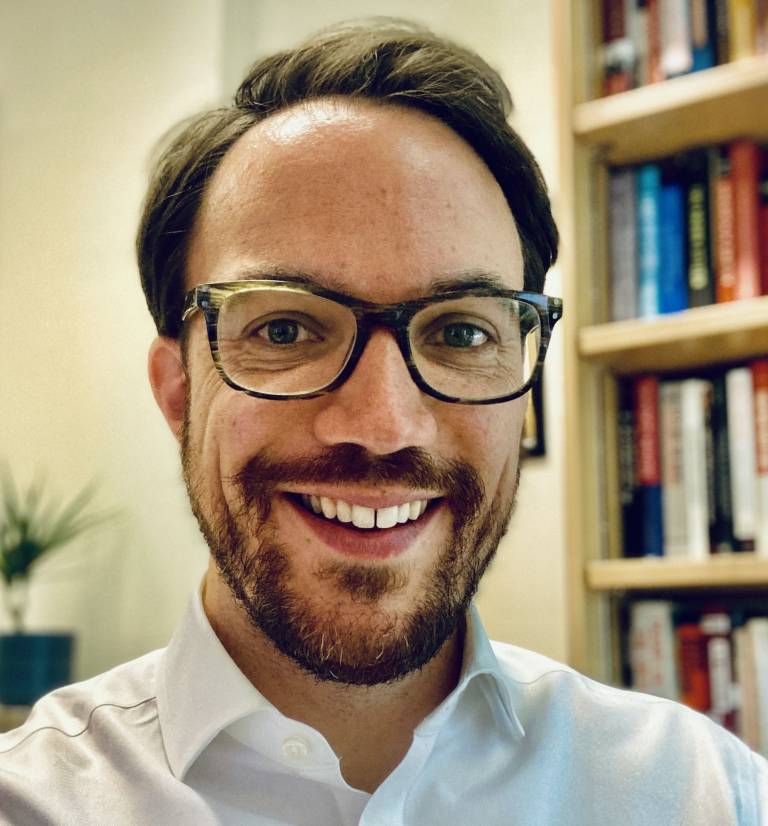Research Spotlight: Dr Nick Witham
27 February 2023
Meet Dr Nick Witham, Associate Professor of United States History and Head of Department at the UCL Institute of the Americas. Find out more about Nick's career and research, as well as his recently rekindled love-affair with DJing.

Hello! Tell us a little bit about yourself, and what you do at UCL.
I’m a historian of the United States. I started working at UCL in 2015 and was appointed Head of Department at the Institute of the Americas in 2022. The Institute is a multi-disciplinary research and teaching department, with staff and student expertise covering North America, Latin America, and the Caribbean. It is the only unit of its kind in the UK, and it’s a privilege to work there.
Tell us about your research.
I’m particularly interested in the way the twentieth century’s political and military conflicts shaped American thought and culture, as well as how intellectual and academic communities have shaped public discourse. To give an example, my second monograph will be published in July. It’s called Popularizing the Past: Historians, Publishers, and Readers in Postwar America and I’ve been working on it for the last ten years or so. It tells the stories of five historians working after World War II who changed the way ordinary Americans thought about their nation’s history via books that sold hundreds of thousands – sometimes millions – of copies. Next up, I want to write a book about the role of ideas in anti-war protest.
What has been your most memorable career moment so far?
It’s hard to pick a single moment: I’ve been very fortunate in my career so far to have worked with remarkable colleagues and to have been able to undertake research I am passionate about. Having said that, I just finished a four-year term as Co-Editor of the Journal of American Studies, one of the leading publications in my field. It was a lot of work, but the feeling of contributing to the discipline, both by implementing a strategic vision for a more inclusive approach to journal publishing, and via the day-to-day work of supporting authors to publish their work, was incredibly satisfying.
What would you do (for a career) if you weren’t doing this?
As well as doing my own research and writing, I enjoy supporting others as they do theirs: helping them see what is valuable about their work, making its core contributions clearer and more engaging, etc. So, I like to think I could have made a career in publishing, probably as an editor. Either that or I’d earn a living writing about wine.
What are your main interests outside work?
My wife and I have a dog and spend a lot of time walking him, which is a unique pleasure. When I have the opportunity, I enjoy surfing, though I live about as far from the sea as it is possible to in England! I collect – and like drinking – wine, I am a passionate cook, and I have recently rekindled a love-affair with DJing, which has its roots in my teenage affection for house music.
If you had to eat one meal, every day for the rest of your life, what would it be?
About 8 years ago, I was diagnosed with coeliac disease, which meant I had to stop eating gluten. I’ve embraced the new diet this requires wholeheartedly. But if I could suspend the reality of the diagnosis, my meal would involve pizza and beer, both of which are passable (sometimes even pretty good) when made gluten free but are nothing like the “real” thing.
What’s your favourite city, and why?
New York City. It’s not only the place in which I’ve spent the most time working in archives, but also one of the most dynamic and exciting places I’ve ever been. The architecture, the food, the music; all of them are remarkable. London is also pretty good.
Where are you happiest?
On a beach. And if the surf is just right, even better.
What book is currently on your bedside table?
Tin Sky by Ben Pastor, part of a series of novels she has written set during World War II. I was switched on to them by a recent essay by Fredric Jameson in the London Review of Books, and they are remarkable. If someone had told me while I was training as a historian that I’d become the type of person who reads World War II novels for pleasure, I’d have sighed deeply. But these aren’t your average World War II novels!
Links
- Dr Nick Witham's research profile
- Dr Nick Witham to take up role of Director of UCL Institute of the Americas
- UCL Institute of the Americas
 Close
Close

